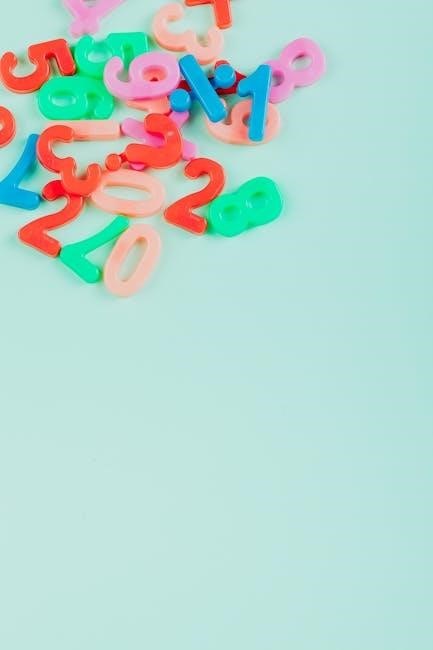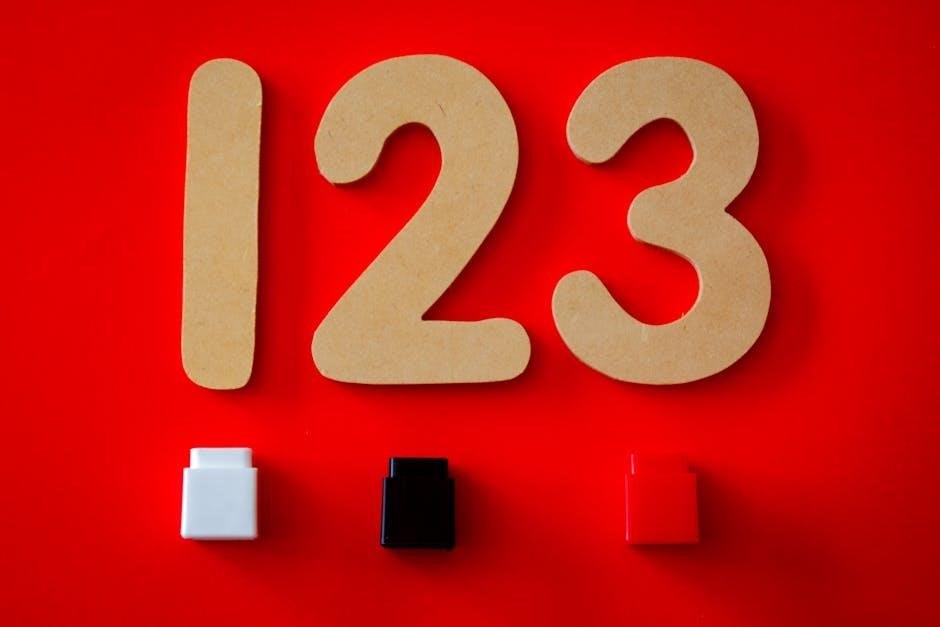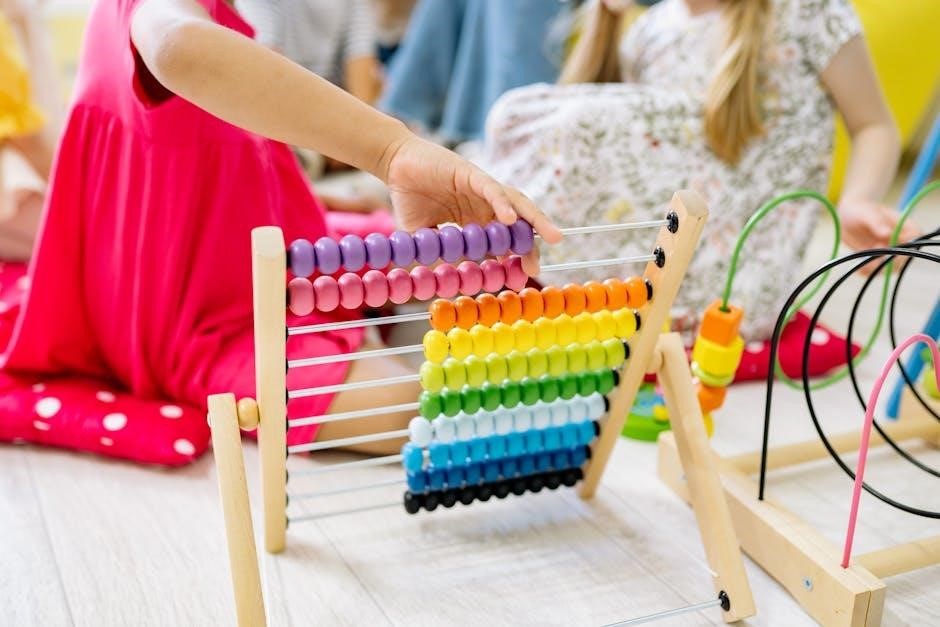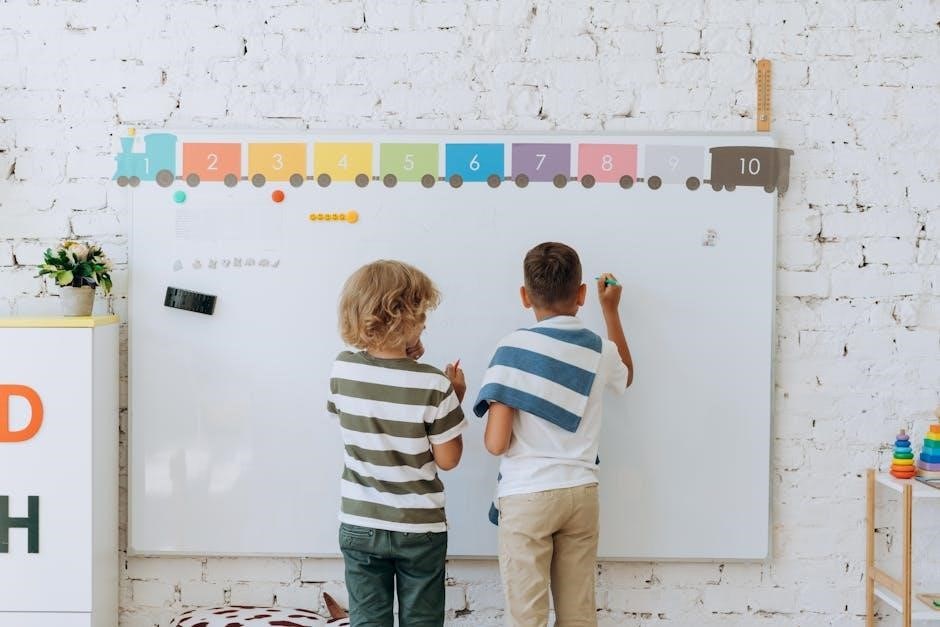
eureka math kindergarten pdf
Eureka Math Kindergarten is a comprehensive curriculum designed to build foundational math skills through structured modules, hands-on activities, and interactive problem sets, fostering early numeracy and critical thinking.
1.1 Overview of Eureka Math Curriculum
Eureka Math is a comprehensive, research-based curriculum designed to promote deep understanding of mathematical concepts. It emphasizes hands-on learning, problem-solving, and critical thinking from an early age. The kindergarten program focuses on foundational skills such as counting, number sense, and basic addition, using visual aids and manipulatives to engage young learners. Structured modules guide students through topics like numbers 1-10, counting to 100, and introductory addition concepts. The curriculum integrates storytelling and real-world applications to make math relatable and fun. With a focus on fluency and number talks, Eureka Math prepares students for future math challenges while fostering a love for learning.
1.2 Importance of Early Math Education
Early math education lays the foundation for future academic success and problem-solving abilities. Introducing concepts like counting, number sense, and basic operations in kindergarten helps children develop critical thinking and logical reasoning. Research shows that early exposure to math builds confidence and a strong work ethic, essential for tackling complex challenges later. Eureka Math’s structured approach ensures that young learners gain a solid understanding of numerical relationships and patterns. This early foundation not only enhances math skills but also improves overall cognitive development, setting the stage for lifelong learning and adaptability in an ever-changing world. Investing in early math education is crucial for fostering intellectual growth and readiness for higher-level thinking.
Structure of Eureka Math Kindergarten Modules
Eureka Math Kindergarten is organized into sequential modules, each focusing on specific skills like numbers, counting, and basic operations, with interactive activities to reinforce learning.
2.1 Module 1: Numbers 1-10 and Counting
Module 1 introduces young learners to the fundamentals of numbers 1-10, focusing on counting, basic number composition, and decomposition. Students engage in hands-on activities using manipulatives and real-world objects to develop a strong foundation in numeracy. The module emphasizes understanding the relationship between numbers through visual aids and interactive problem sets. Lessons are designed to foster curiosity and confidence, with activities that encourage students to express their thinking aloud. Fluency exercises and number talks are integrated to promote a deep understanding of numerical concepts. This module sets the stage for more complex math skills, ensuring students grasp the basics before progressing to higher-level tasks.
2.2 Module 2: Numbers 10-20 and Basic Addition
Module 2 expands students’ understanding by introducing numbers 10-20 and basic addition concepts. Lessons focus on counting beyond 10, recognizing number patterns, and solving simple addition problems. Activities include using manipulatives to represent numbers and engage in hands-on addition exercises. Problem sets and number talks encourage students to articulate their thinking and develop fluency with numbers. The module also introduces word problems, such as “add to” scenarios, to apply math skills in real-world contexts. Visual aids and storytelling techniques are incorporated to make learning engaging and accessible. By the end of this module, students are expected to demonstrate proficiency in counting up to 20 and solving basic addition problems with accuracy and confidence.

Key Features of Eureka Math for Kindergarten
Eureka Math Kindergarten emphasizes problem sets, number talks, and visual aids to engage young learners. Manipulatives and storytelling make math interactive, fostering a strong numerical foundation.
3.1 Problem Sets and Activities
Eureka Math Kindergarten incorporates engaging problem sets and activities designed to develop foundational math skills through hands-on learning. These activities are structured to introduce concepts like counting, basic addition, and number decomposition in a playful and interactive manner. Problem sets are tailored to reinforce lessons, encouraging children to apply what they’ve learned. Activities often involve visual aids, manipulatives, and real-world scenarios to make math relatable and fun. For example, students might use blocks or drawings to solve problems, fostering creativity and critical thinking. These structured yet flexible exercises help build confidence and a strong numerical foundation, preparing young learners for more complex math concepts in the future. The activities are also designed to promote collaboration and teamwork, enhancing social skills alongside academic growth;
3.2 Fluency and Number Talks
Fluency and Number Talks are integral components of Eureka Math Kindergarten, designed to enhance students’ ability to recall math facts and engage in meaningful mathematical discussions. Fluency activities focus on developing quick and accurate recall of numbers and basic operations, while Number Talks encourage students to think critically and communicate their problem-solving strategies. These sessions often involve visual aids, such as counting blocks or number lines, to help students visualize concepts. By fostering a deep understanding of numbers and their relationships, Eureka Math equips young learners with the confidence and skills needed to tackle more complex math problems. These interactive practices also promote collaboration and verbal reasoning, laying the groundwork for lifelong math proficiency.

Benefits of Using Eureka Math in Kindergarten
Eureka Math Kindergarten builds a strong foundation in numeracy, enhances problem-solving skills, and fosters a deep understanding of mathematical concepts, preparing students for future academic success.
4.1 Development of Critical Thinking Skills
Eureka Math Kindergarten fosters critical thinking through engaging problem sets and activities that encourage analytical reasoning. By exploring numbers, counting, and basic addition, students develop logical thinking and creativity. The curriculum emphasizes decomposition of numbers, allowing children to understand relationships between quantities. Visual aids and manipulatives further enhance their ability to approach problems methodically. Fluency exercises and number talks promote articulation of mathematical ideas, strengthening problem-solving abilities. These practices lay a strong foundation for advanced math concepts, teaching students to think deeply and systematically from an early age.
4.2 Preparation for Future Math Concepts
Eureka Math Kindergarten lays a robust foundation for future math concepts by introducing essential skills like counting, basic addition, and number decomposition. These early lessons build a strong number sense, crucial for understanding place value and more complex operations in higher grades. The curriculum’s structured modules and hands-on activities help students visualize mathematical relationships, making abstract concepts more accessible. By practicing problem sets and engaging in number talks, children develop a systematic approach to problem-solving, which is vital for tackling advanced math. The introduction to foundational terminology and strategies in Kindergarten ensures a smooth transition to more challenging concepts, equipping students with the confidence and skills needed for long-term academic success.
Teaching Methods in Eureka Math Kindergarten
Eureka Math Kindergarten employs interactive teaching methods, incorporating problem sets, number talks, and visual aids to engage students in hands-on learning, fostering a deep understanding of math concepts.
5.1 Use of Visual Aids and Manipulatives
Eureka Math Kindergarten heavily incorporates visual aids and manipulatives to create an engaging learning environment. These tools, such as counting blocks, number lines, and geometric shapes, help students visualize abstract concepts. By using these resources, children can explore math through hands-on activities, making learning interactive and accessible. Visual aids like charts and diagrams are also used to demonstrate relationships between numbers and operations, aiding in the development of a strong number sense. Manipulatives encourage active participation, allowing students to experiment and understand math principles concretely. This approach supports different learning styles and ensures that all students can grasp key concepts effectively.
5.2 Storytelling in Math Lessons
Storytelling is a vibrant component of Eureka Math Kindergarten, making math lessons engaging and relatable. Through narratives, teachers introduce characters and scenarios that simplify complex concepts, fostering curiosity and interest. Stories often involve word problems or real-world applications, helping students connect math to their everyday lives. This approach encourages active participation, as children discuss and solve problems within the context of the story. Storytelling also aids in developing critical thinking and communication skills, as students explain their reasoning and solutions. By integrating stories, Eureka Math creates a dynamic and interactive learning environment, ensuring math is both fun and accessible for young learners.

Role of Parents in Supporting Eureka Math Learning
Parents play a crucial role by reinforcing math concepts at home, encouraging problem-solving, and maintaining open communication with teachers to support their child’s learning journey effectively.
6.1 Tips for Reinforcing Math at Home
Parents can reinforce Eureka Math concepts by incorporating math into daily routines, such as counting objects or discussing number sense during play. Using manipulatives like blocks or counters helps visualize math problems. Encourage children to explain their thinking, fostering communication and critical thinking. Utilize Eureka Math resources, such as PDF workbooks or online tools, to practice skills. Engage in activities that involve measurement, comparison, or basic addition, making math fun and relevant. Celebrate progress and provide positive feedback to build confidence; By creating a supportive environment, parents can help their child develop a strong foundation in math and a lifelong love for learning.
6.2 Communicating with Teachers
Effective communication with teachers is essential for supporting a child’s learning in Eureka Math. Parents should regularly check in with teachers to discuss progress, understand curriculum goals, and identify areas where their child may need extra support. Attending parent-teacher conferences and joining classroom updates can provide valuable insights. Asking questions about specific math concepts or strategies used in class helps parents reinforce learning at home. Teachers often share resources, such as PDF workbooks or online tools, to supplement practice. By maintaining open lines of communication, parents and teachers can collaborate to create a consistent and supportive learning environment for the child, ensuring they thrive in math and beyond.

Digital and Printable Resources for Eureka Math
Eureka Math offers a variety of digital and printable resources, including PDF workbooks, interactive modules, and online tools, to support engaging and effective math learning experiences.
7.1 PDF Workbooks and Modules
Eureka Math provides an array of downloadable PDF resources, including workbooks and modules, designed for kindergarten students. These materials are structured to align with the curriculum’s focus on foundational math skills. Each module, such as Kindergarten Module 1, offers detailed lesson plans, problem sets, and activities to engage young learners. The PDF workbooks are user-friendly, allowing parents and teachers to print and use them flexibly. With high ratings and thousands of downloads, these resources are widely recognized for their effectiveness in supporting early math education. They include interactive exercises, number talks, and visual aids, making learning both fun and comprehensive for kindergarten students.
7.2 Online Tools and Games
Eureka Math offers a variety of online tools and games to enhance kindergarten math learning. These digital resources are designed to complement the PDF workbooks and modules, providing interactive and engaging ways for young students to practice skills. Games focus on number sense, counting, and basic addition, while interactive activities like number talks and problem sets are available online. Parents and teachers can access these tools through the official Eureka Math website or affiliated educational platforms. The digital manipulatives and real-time feedback features make learning fun and effective. Additionally, online games help reinforce math concepts in a playful manner, ensuring kindergarten students develop fluency and problem-solving skills in an enjoyable way.